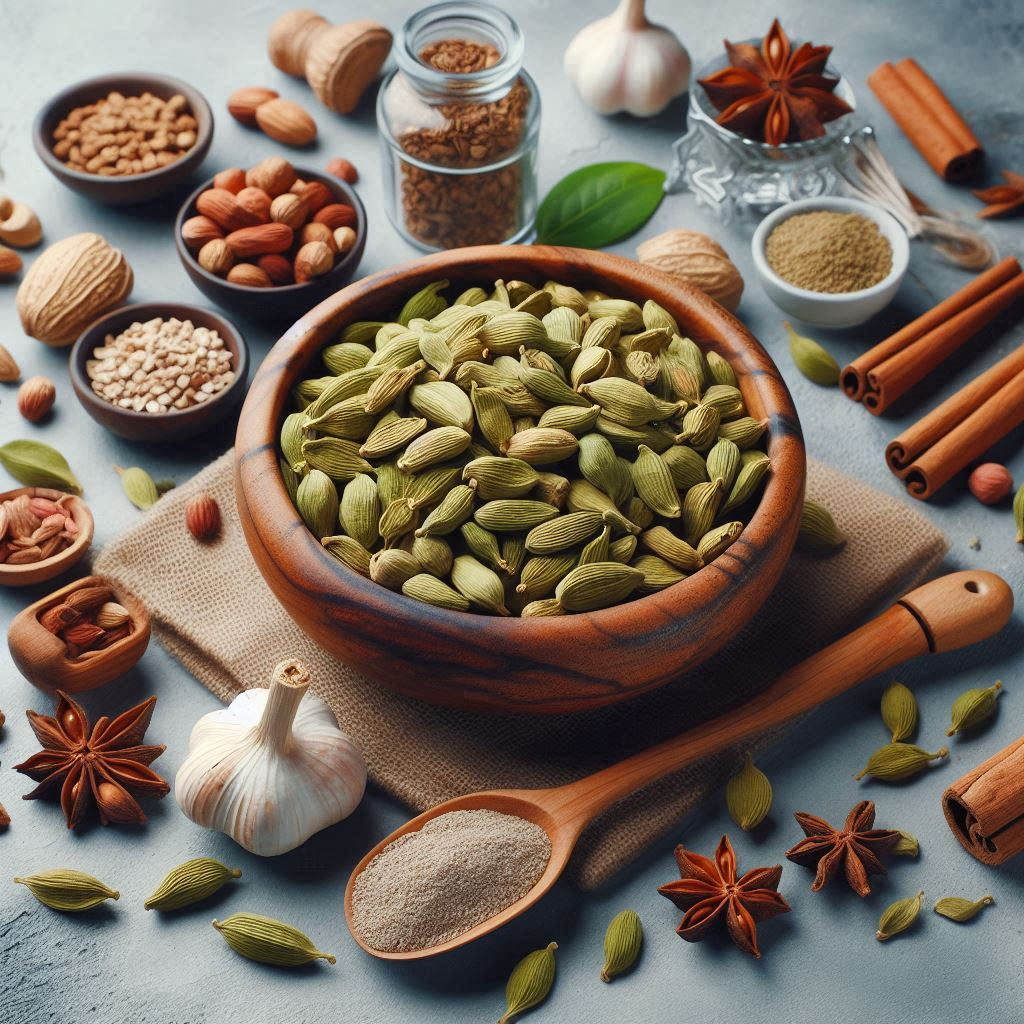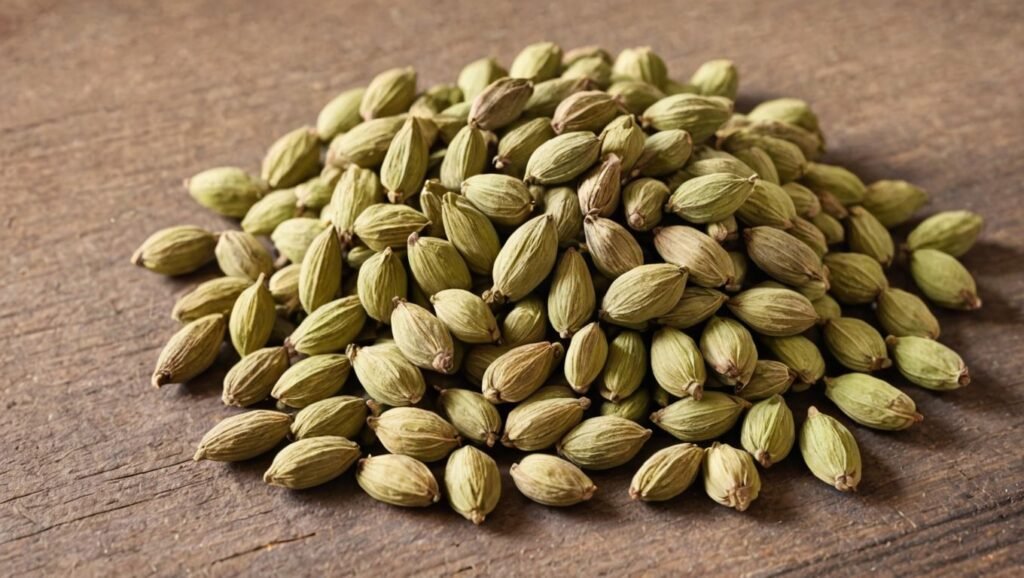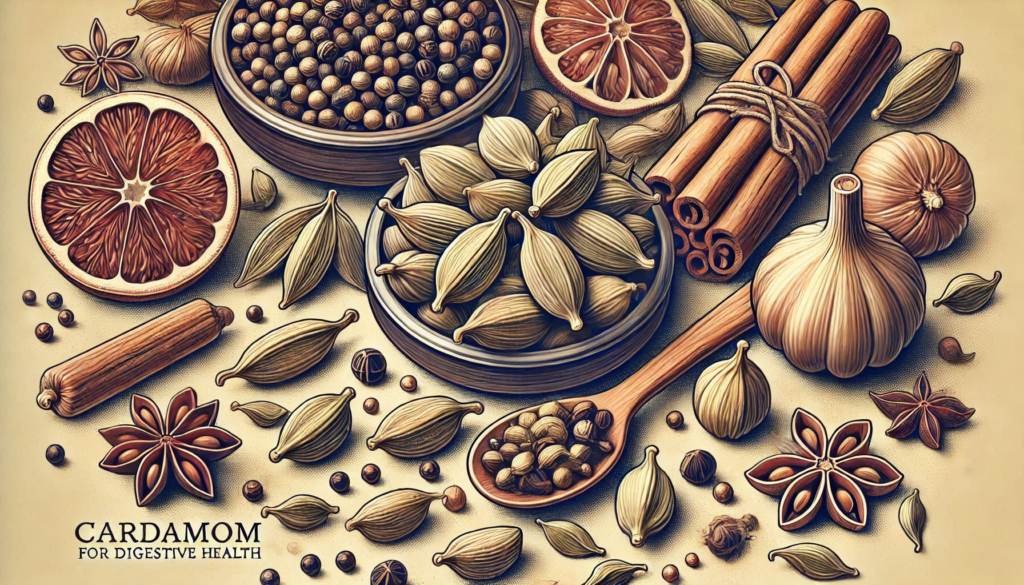
10 Actionable Health Benefits of Cardamom You Need to Know
Explore the essential health benefits of cardamom for wellness and vitality in your daily diet.


Introduction
Overview of Cardamom as a Spice and Its Historical Use
Cardamom, often referred to as the “Queen of Spices,” has been cherished for centuries for its unique flavor and aromatic qualities. Originating from the Indian subcontinent, cardamom has been used in traditional medicine, culinary practices, and rituals. Its rich history dates back to ancient civilizations, where it was prized for its medicinal properties and traded as a valuable commodity.
Importance of Understanding the Health Benefits of Cardamom
Understanding the health benefits of cardamom is essential for making informed choices about incorporating this spice into your daily routine. Cardamom offers a wide range of health benefits, from improving digestion to reducing inflammation. By exploring these benefits, you can harness the power of cardamom to enhance your overall well-being.
Purpose of the Article
The purpose of this article is to highlight ten actionable health benefits of cardamom and provide practical tips for incorporating this spice into your diet. By understanding the various ways cardamom can support your health, you can make informed decisions to improve your wellness and vitality.

Health Benefit 1: Improved Digestion
Cardamom for Digestive Health
Cardamom is renowned for its ability to aid digestion and alleviate digestive issues. The essential oils in cardamom, such as cineole and terpinene, stimulate the production of digestive enzymes, which helps break down food more efficiently.
How Cardamom Aids Digestion
Cardamom helps relax the muscles of the gastrointestinal tract, reducing the likelihood of cramps and spasms. It also promotes the secretion of bile and gastric juices, which are essential for proper digestion.
Essential Oils in Cardamom That Enhance Digestion
The essential oils in cardamom, including cineole, terpinene, and limonene, have carminative properties that help reduce gas and bloating. These oils also have antimicrobial effects, which can help prevent infections in the digestive tract.
Preventing Indigestion, Bloating, and Constipation with Cardamom
Cardamom can help prevent indigestion, bloating, and constipation by promoting smooth digestion and reducing the buildup of gas. Its natural carminative properties make it an effective remedy for these common digestive issues.
Incorporating Cardamom into Your Diet for Digestion
- Tips for Using Cardamom in Meals and Beverages: Add ground cardamom to your morning coffee or tea for a flavorful twist. Sprinkle cardamom powder on oatmeal, yogurt, or fruit salads. Use cardamom pods in savory dishes like curries and stews.
- Recipes Featuring Cardamom for Digestive Health: Make a soothing cardamom tea by steeping crushed cardamom pods in hot water. Create a spiced yogurt parfait with cardamom, honey, and fresh fruit. Prepare a fragrant rice dish with cardamom, cinnamon, and cloves.

Health Benefit 2: Anti-Inflammatory Properties
Cardamom’s Anti-Inflammatory Effects
Cardamom contains compounds with potent antiinflammatory properties, such as cineole and limonene. These compounds help reduce inflammation in the body, which can benefit individuals with chronic inflammatory conditions.
Compounds in Cardamom That Reduce Inflammation
The essential oils in cardamom, including cineole, limonene, and alpha-pinene, have been shown to inhibit the production of inflammatory mediators. This helps reduce inflammation and alleviate symptoms of conditions like arthritis and inflammatory bowel disease.
Benefits for Conditions Like Arthritis and Chronic Diseases
Cardamom’s anti-inflammatory properties can help manage symptoms of arthritis, such as joint pain and stiffness. It may also benefit individuals with chronic diseases characterized by inflammation, such as cardiovascular disease and diabetes.
Using Cardamom to Combat Inflammation
- How to Include Cardamom in Your Daily Routine: Add cardamom to your daily meals and beverages to harness its anti-inflammatory benefits. Use cardamom in cooking, baking, and as a seasoning for various dishes.
- Recipes and Remedies for Inflammation Relief: Make a turmeric and cardamom latte for a powerful anti-inflammatory drink. Prepare a spicy vegetable soup with cardamom, ginger, and turmeric. Create a soothing cardamom and honey tea to reduce inflammation.
Health Benefit 3: Antioxidant Activity
Cardamom as a Source of Antioxidants
Cardamom is rich in antioxidants, which play a crucial role in protecting cells from oxidative damage. These antioxidants help neutralize free radicals, reducing the risk of chronic diseases and promoting overall health.
Antioxidants in Cardamom and Their Role in Health
Cardamom contains several powerful antioxidants, including flavonoids, terpenoids, and phenolic acids. These compounds help protect cells from oxidative stress, reduce inflammation, and support the immune system.
Protecting Cells from Oxidative Damage
The antioxidants in cardamom help protect cells from oxidative damage caused by free radicals. This protection is essential for preventing chronic diseases, such as heart disease, cancer, and neurodegenerative disorders.
Enhancing Your Diet with Cardamom’s Antioxidants
- Ways to Add Cardamom to Your Meals: Sprinkle ground cardamom on your morning oatmeal or yogurt. Add cardamom to smoothies, teas, and baked goods for a flavorful antioxidant boost.
- Recipes Rich in Antioxidants: Make a cardamom-spiced smoothie with spinach, berries, and almond milk. Create a cardamom and turmeric latte for a powerful antioxidant drink. Prepare a carrot and orange salad for a refreshing and healthy dish.
Health Benefit 4: Enhanced Heart Health
Cardamom for Cardiovascular Health
Cardamom has been shown to support cardiovascular health by reducing blood pressure and cholesterol levels. Its anti-inflammatory and antioxidant properties also contribute to heart health.
How Cardamom Helps Reduce Blood Pressure and Cholesterol
Cardamom contains compounds that help relax blood vessels, reducing blood pressure. It also helps lower cholesterol levels by promoting the excretion of bile acids, which are made from cholesterol.
Preventing Heart Diseases with Cardamom
By reducing blood pressure, cholesterol levels, and inflammation, cardamom helps lower the risk of heart diseases, such as hypertension, atherosclerosis, and heart attacks.
Cardamom Recipes for Heart Health
- HeartHealthy Recipes Featuring Cardamom: Make a heart-healthy cardamom and quinoa salad with mixed greens and avocado. Prepare a cardamom-spiced lentil soup for a nutritious and heart-friendly meal.
- Tips for Incorporating Cardamom into a Heart-Healthy Diet: Use cardamom as a seasoning for roasted vegetables and lean proteins. Add cardamom to your morning coffee or tea for a heart-healthy start to your day.
Health Benefit 5: Diabetes Management
Cardamom and Blood Sugar Regulation
Cardamom contains compounds that help improve glucose metabolism and regulate blood sugar levels. This makes it a valuable addition to a diabetes-friendly diet.
Compounds in Cardamom That Improve Glucose Metabolism
The essential oils in cardamom, such as cineole and terpinene, help improve insulin sensitivity and enhance glucose uptake by cells. This helps regulate blood sugar levels and prevent spikes.
Reducing the Risk of Type 2 Diabetes with Cardamom
By improving glucose metabolism and insulin sensitivity, cardamom helps reduce the risk of developing type 2 diabetes. Its anti-inflammatory and antioxidant properties also support overall metabolic health.
Using Cardamom for Diabetes Management
- Recipes and Tips for Using Cardamom to Manage Blood Sugar Levels: Make a cardamom-spiced chia pudding with almond milk and fresh berries. Prepare cardamom and cinnamon tea to help regulate blood sugar levels.
- How to Include Cardamom in a Diabetes-Friendly Diet: Add cardamom to your morning smoothie or oatmeal. Use cardamom in savory dishes such as curries and stews for added flavor and health benefits.
Health Benefit 6: Anti-Cancer Effects
Cardamom’s Cancer-Fighting Compounds
Cardamom contains compounds that have been shown to inhibit the growth of cancer cells and promote apoptosis (programmed cell death). These compounds include cineole, limonene, and alpha-pinene.
How Cardamom Inhibits the Growth of Cancer Cells
The bioactive compounds in cardamom help inhibit the growth and spread of cancer cells by inducing apoptosis and preventing angiogenesis (the formation of new blood vessels that supply tumors).
Research on Cardamom’s Anti-Cancer Properties
Several studies have demonstrated the anti-cancer properties of cardamom, showing its potential to reduce the risk of various types of cancer, including colorectal, breast, and prostate cancer.
Incorporating Cardamom for Cancer Prevention
- Tips for Using Cardamom to Reduce Cancer Risk: Add cardamom to your daily meals and beverages to harness its anti-cancer benefits. Use cardamom in cooking, baking, and as a seasoning for various dishes.
- Recipes and Remedies for Cancer Prevention: Make a cardamom and ginger tea for a powerful anti-cancer drink. Prepare a cardamom-spiced vegetable stir fry with turmeric and garlic. Create a cardamom and berry smoothie for a delicious and health-boosting treat.
Health Benefit 7: Oral Health Benefits
Cardamom for Oral Hygiene
Cardamom has powerful antimicrobial properties that make it an excellent natural remedy for oral health. The essential oils in cardamom, such as cineole and terpinene, help combat bacteria and prevent infections in the mouth.
Antimicrobial Properties of Cardamom for Oral Health
The antimicrobial compounds in cardamom help reduce the growth of harmful bacteria in the mouth, preventing gum infections, tooth decay, and bad breath. Chewing cardamom seeds can also help freshen breath and maintain oral hygiene.
Preventing Bad Breath, Gum Infections, and Tooth Decay
Cardamom’s antimicrobial properties help prevent bad breath by neutralizing odor-causing bacteria. It also helps prevent gum infections and tooth decay by reducing bacterial growth and promoting overall oral health.
Using Cardamom for Better Oral Health
- Tips for Incorporating Cardamom into Your Oral Care Routine: Chew cardamom seeds after meals to freshen breath and promote oral hygiene. Add a few drops of cardamom essential oil to your toothpaste or mouthwash for added antimicrobial benefits.
- Recipes and Remedies for Oral Health: Make a homemade mouthwash by mixing cardamom essential oil with water and a pinch of salt. Create a natural toothpaste by combining cardamom powder with baking soda and coconut oil.
Health Benefit 8: Respiratory Health Improvement
Cardamom for Respiratory Health
Cardamom has expectorant properties that make it effective for relieving respiratory conditions. It helps clear congestion, reduce cough, and improve overall respiratory health.
Expectorant Properties of Cardamom for Respiratory Conditions
The essential oils in cardamom, such as cineole and terpinene, help loosen mucus and phlegm, making it easier to expel from the respiratory tract. This helps relieve symptoms of cough, congestion, and asthma.
Relieving Symptoms of Cough, Congestion, and Asthma
Cardamom’s expectorant properties help relieve symptoms of respiratory conditions by clearing mucus and reducing inflammation in the airways. It can also help soothe irritated respiratory tissues and improve breathing.
Cardamom Remedies for Respiratory Health
- Tips for Using Cardamom to Improve Respiratory Health Add cardamom to your daily diet to support respiratory health. Use cardamom essential oil in a diffuser to inhale its therapeutic vapors.
- Recipes and Remedies for Respiratory Relief: Make a soothing cardamom and honey tea to relieve cough and congestion. Prepare a steam inhalation with cardamom essential oil to clear nasal passages and improve breathing.
Health Benefit 9: Mood Enhancement
Cardamom as a Mood Enhancer
Cardamom contains natural compounds that can help improve mood and reduce stress. Its calming effects on the body make it a valuable addition to your daily routine for mental well-being.
Natural Compounds in Cardamom That Improve Mood
The essential oils in cardamom, such as cineole and limonene, have mood-enhancing properties that help reduce anxiety and promote relaxation. These compounds can improve overall mental wellbeing and reduce stress.
Calming Effects of Cardamom on the Body
Cardamom’s calming effects help reduce stress and anxiety by promoting relaxation and improving mood. It can also help improve sleep quality and support overall mental health.
Using Cardamom for Mood Improvement
- Tips for Incorporating Cardamom into Your Daily Routine: Add cardamom to your morning coffee or tea for a calming start to your day. Use cardamom essential oil in a diffuser to create a relaxing atmosphere at home.
- Recipes and Remedies for Mood Enhancement: Make a calming cardamom and lavender tea to reduce stress and promote relaxation. Prepare a soothing cardamom and chamomile bath to unwind and improve mood.
Health Benefit 10: Weight Management
Cardamom for Weight Loss
Cardamom can aid in weight loss and metabolism by promoting fat burning and reducing appetite. Its thermogenic properties help increase metabolism and support weight management.
How Cardamom Aids in Weight Loss and Metabolism
The essential oils in cardamom, such as cineole and terpinene, have thermogenic properties that help increase metabolism and promote fat burning. Cardamom also helps reduce appetite and cravings, making it easier to manage weight.
Benefits of Cardamom for Appetite Control
Cardamom’s appetite-suppressing properties help reduce cravings and promote satiety, making it easier to control portion sizes and manage weight. It can also help regulate blood sugar levels, reducing the likelihood of overeating.
Incorporating Cardamom for Weight Management
- Tips for Using Cardamom to Support Weight Loss Add cardamom to your meals and beverages to support weight loss and metabolism. Use cardamom essential oil in a diffuser to reduce appetite and cravings.
- Recipes and Remedies for Weight Management: Make a cardamom and green tea blend to boost metabolism and promote fat burning. Prepare a cardamom-spiced smoothie with protein powder and almond milk for a satisfying and weight-friendly meal.
Conclusion
Recap of the 10 Actionable Health Benefits of Cardamom
In this article, we explored ten actionable health benefits of cardamom:
- Improved Digestion
- Anti-Inflammatory Properties
- Antioxidant Activity
- Enhanced Heart Health
- Diabetes Management
- Anti-Cancer Effects
- Oral Health Benefits
- Respiratory Health Improvement
- Mood Enhancement
- Weight Management
Encouragement to Incorporate Cardamom into Your Daily Routine
Incorporating cardamom into your daily routine can help improve your overall health and well-being. Experiment with different recipes and remedies to find what works best for you.
Final Thoughts on the Importance of Cardamom for Overall Health
Cardamom is a versatile and powerful spice that offers numerous health benefits. By understanding its various uses and incorporating it into your diet, you can support your body’s natural ability to maintain optimal health.
I hope this detailed information helps you understand the benefits of cardamom and how to incorporate it into your diet!




One Comment
Pingback: